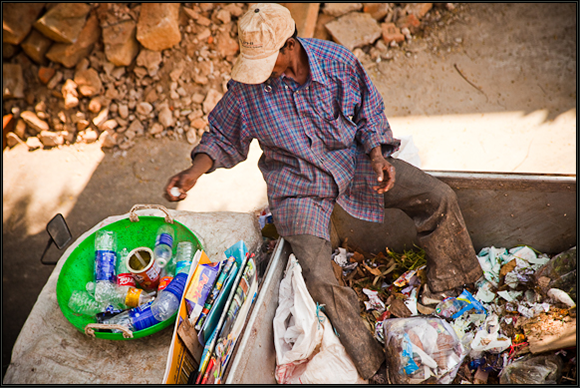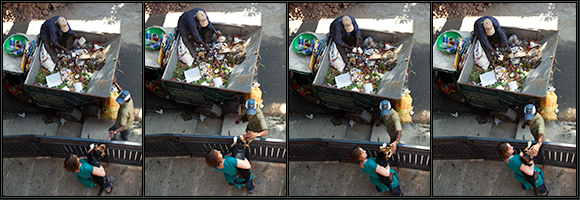We Americans are prissy about our trash. Once we put it in the trash can, we don’t ever want to think about it again. Where it goes, who takes it there, what is done with it when it arrives. In our culture, trash just goes away. Here, in our quaint, quiet, middle class neighborhood, the trash men come every day, usually around the time I settle into working.
![]()
I can hear the whistle blowing from a block away; I grab my trashcan and run down three flights of stairs. Every day I am embarrassed: my neighbors bring out their tiny waste baskets with a few cellophane wrappers and some dust in the bottom, while I stand at my gate with a five gallon bucket of refuse. Juice boxes, plastic soda bottles, food that has gone bad, half a pineapple we forgot to eat. This shameful illustration of our wastefulness pains me.
In the street below a small dump truck arrives. There is one man driving, one man taking the trashcans from the neighbors and dumping them into the back of the truck, and a third man sitting in the bed of the truck, ankle deep in garbage, sifting barehanded though each and every piece of rotting stinking trash that has been hurled into the truck. We are horrified by this, all of this. We are not sure what is worse – having our trash so thoroughly picked through, or the fact that it is done with bare hands and bare feet.

.
He tears open tiny bags and scrapes out boxes. Everything is recycled by someone, somewhere along the line. Anything of value is picked out, cleaned off, fixed, reused: one afternoon I watched three small girls prying the metal rings off of a four foot mountain of liquor bottles, tossing the glass in one pile, and the metal in another. Plastic bottles never go to waste; they are used for petrol and refilled with water for bathing, or drinking. What isn’t used is bundled together with the other plastics and sold to the recycler. Any remaining food scraps are tossed in a field to feed the cows and pigs.
Wasting food in India is a cardinal sin. Each day I try to do better, to shop better, to use what I already have, and feed what is left to Kali. Still, sometimes I sneak out at night and dump our extra leftovers on the street corner for the emaciated street dogs to eat, and to save myself the disgrace of having it show up in our trashcan.
This garbage arrangement isn’t a city service, it is a private enterprise. I’m not sure how it works with other people, but when we first moved here the young man took my trash, and asked for money. I thought he was asking for water, and ran upstairs and got him a glass. The next day I gave him a hundred rupees, around two dollars. I’m pretty sure I overpaid, because since then he’s been my best friend. He blows his whistle in front of our house, and waits for as long as it takes for me to get downstairs with my garbage. Kali races downstairs when she hears his whistle, and wags her whole body until he scratches her head and gives her some garbage-love.

.
I cringe when I watch these young men dig through the filth. But they are the trash men, and this is what they do, it is their birthright. It’s what their fathers did, and what their sons will do. And along the way, if any one of them should aspire to do something different, it’ll be a long slippery climb out of the garbage pit; and this is the New India. The New India with a growing middle class. The New India that has abolished the caste system and child labor. The India with education and opportunity for all.
![]()
It’s easy to send a message of booming progress overseas when all evidence to the contrary is safely obscured by a distance of several thousand miles. But spending any real time on Indian soil will likely challenge the fashionable narrative that this place is on the verge of becoming the next economic powerhouse. When an eight-year-old serves you tea, you’ll question how successfully child labor has been abolished. When it happens the next day, and the next, and when you see a ten-year-old at a sewing machine in the market, or changing a tire at the ‘puncher shop,’ you might stop believing the hype altogether. When seven kids behind a cash register have the same look of total befuddlement, and you start to figure out that a large percentage of the population is barely literate, and then you see the disdain with which the upper classes treat the lower classes, you may even come away from the experience questioning whether India should even be allowed to even sit with the grownups yet.
This isn’t to say that America doesn’t have its own problems; it surely does. And we can start by learning from India’s example, and being more a lot careful about what we throw away.